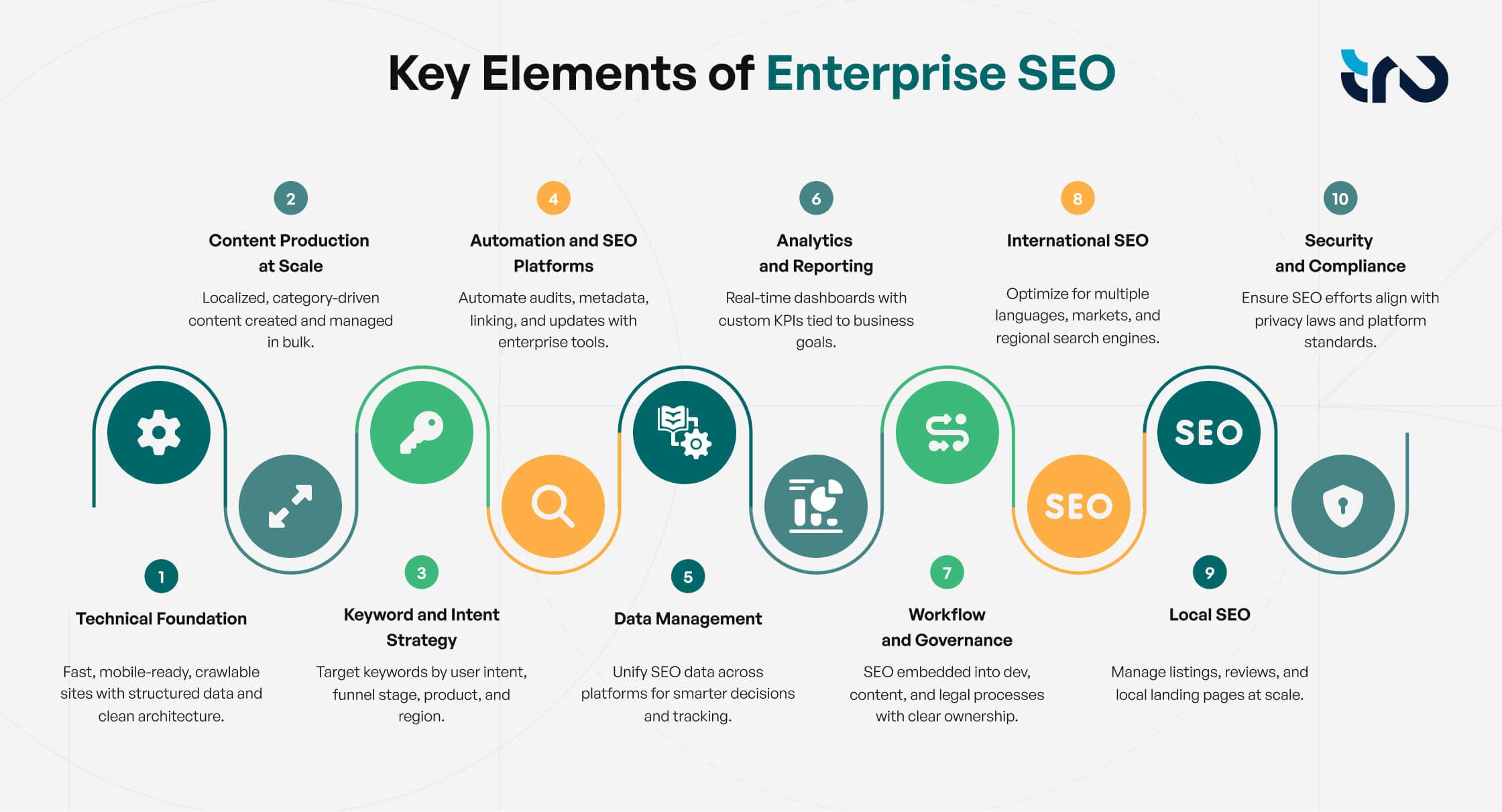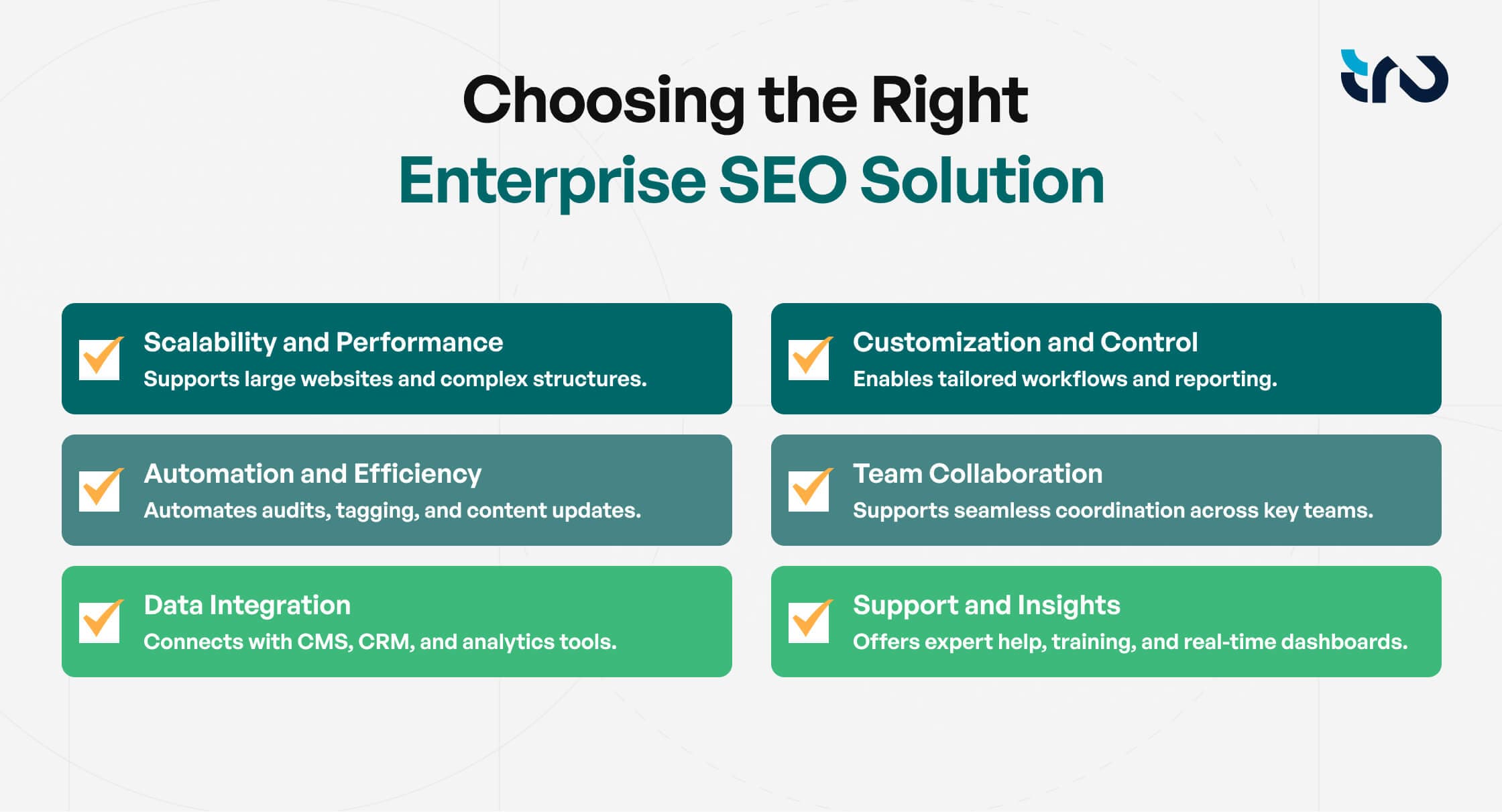Enterprise websites are typically large and complex, featuring numerous web pages, advanced features, and extensive functionality. They have platform integrations, advanced tools, automation, and need to scale over time.
SEO for such sophisticated websites is not done in a generic way or through manual processes. It requires more tools, software, and smart techniques to boost rankings, visibility, and performance.
This blog is a complete framework on enterprise SEO, what it is, how it’s different from traditional SEO, key elements, challenges, solutions, and approach to choose the right SEO platform.
What is Enterprise SEO
Enterprise SEO refers to the marketing approach used to optimize the search engine rankings of enterprise websites with complex technical architecture, using advanced capabilities like automation, integrations, and large-scale content management.
A strategy for Enterprise SEO requires close consideration of scalability, complexity, operational tracking, budget allocation, and risk management. To implement Enterprise SEO effectively, involve SEO, data, development, and content teams early to prevent future overruns.
Key Elements and Strategic Approach to Enterprise SEO

A successful enterprise SEO strategy is built on core elements that work together to ensure scalability, performance, and long-term search growth. Below is the curated list of these key elements, each requiring a precise, outcome-driven approach.
1. Technical SEO Infrastructure
Enterprise SEO begins with a robust technical foundation. A well-structured website, fast loading time, mobile responsiveness, schema markups, XML sitemaps, and robots.txt ensure scalability and easier crawlability across thousands of pages.
2. Scalable Content Production
Creating relevant, high-quality content at scale is non-negotiable. Enterprise SEO uses trend analysis tools, content clustering, and strategic keyword planning to maintain consistency across regions, languages, and categories.
3. Strategic Keyword & Intent Mapping
Keyword strategies must go beyond volume. Enterprises focus on aligning keywords with user intent across different buyer stages, ensuring deeper relevance and higher content performance across massive catalogs.
4. Automation & SEO Platforms
Automation is critical in managing enterprise-scale SEO. Platforms help automate audits, content updates, reporting, and tracking, reducing manual load while ensuring accuracy and consistency across touchpoints.
Want to explore how AI can automate tasks in the marketing funnel? Dive into our blog: Could AI Design Your Entire Marketing Funnel? We Tried It.
5. Integrated SEO Data Management
Enterprise SEO integrates with analytics, CRM, and marketing systems. This connected data environment supports better performance tracking, strategic decision-making, and content personalization at scale.
6. Real-Time Analytics & Reporting
Continuous monitoring through real-time dashboards and custom reports enables fast, insight-driven decisions. Enterprises track KPIs like visibility, traffic, and ROI across business units and geographies.
7. Workflow & Governance Models
Standardized SEO workflows are essential for collaboration across SEO, dev, and content teams. Governance models ensure version control, compliance, and consistent execution across global teams.
8. Multilingual & Global Strategy
For global enterprises, SEO strategy includes managing regional content, hreflang implementation, and localized keyword research. Central control with flexible regional execution helps maintain global relevance.
9. Localized SEO Optimization
To win in specific regions or cities, enterprise SEO builds localized landing pages, optimizes Google Business Profiles, and uses hyperlocal signals to boost visibility in local search results.
10. Security & Compliance
Compliance with data privacy laws and technical standards is crucial. Enterprise SEO emphasizes secure protocols, accessibility, and data governance to reduce risks and build stakeholder trust.
Need help building long-term visibility? Check out our SEO and Organic Marketing Services. Let Tru, as the best enterprise SEO agency, help you scale rankings, traffic, and authority through data-backed strategies.
Enterprise SEO vs Traditional SEO
Enterprise SEO supports large-scale operations with automation and cross-team collaboration, while Traditional SEO focuses on smaller sites with manual tactics.
Here’s a detailed table breaking down the key differences between the two.
Aspect | Enterprise SEO | Traditional SEO |
|---|---|---|
Scale and Structure | Built for websites with thousands of pages, teams, and multi-site complexity | Best suited for small to mid-size sites managed by fewer resources |
Tools and Automation | Uses enterprise platforms with automation, APIs, and workflow integration | Relies on standard tools with mostly manual processes |
Content Strategy | High-volume content management across categories, regions, or business units | Targeted content for a focused niche or local market |
Technical Optimization | Advanced setup including structured data, performance tuning, and crawl control | Basic SEO elements like meta tags, mobile-friendliness, and speed |
Keyword and Reporting | Scaled keyword targeting and custom dashboards with detailed KPIs | Core keyword tracking with standard reporting tools |
Change Management | Requires coordination, testing, and staged rollouts | Fast implementation with minimal approval layers |
Power Your Enterprise Visibility and Performance with Tru.
Contact UsChoosing the Right Enterprise SEO Solution
When choosing an enterprise SEO platform, focus on what matters most for your team and website needs. A well-chosen solution not only streamlines operations but also drives long-term SEO success at scale.

Scalability and Performance Capabilities
The platform should support large websites with thousands of pages and complex site structures. It must ensure speed, stability, and flexibility as your business and digital footprint grow.
Automation and Operational Efficiency
Look for features that automate technical audits, tagging, and bulk content updates. This helps reduce manual effort, minimizes errors, and accelerates delivery timelines.
Data Integration Compatibility
Ensure the solution can integrate with your CMS, CRM, analytics, and marketing tools. Unified data pipelines help make faster decisions and uncover deeper insights.
Customization and Workflow Control
Choose a platform that allows flexible workflows, tailored reporting, and granular settings. This ensures it aligns with your internal processes and evolving SEO goals.
Team Collaboration Support
The platform should make it easy for SEO, content, development, and analytics teams to work together. Shared access, task management, and permissions are key for operational alignment.
Expert Support and Insights
Opt for a provider that offers expert guidance, onboarding, and ongoing training. Real-time dashboards and proactive support are essential for staying ahead in competitive markets.
Monitor what matters most! Tru’s Data Tracking Services help enterprises measure and refine performance across every digital touchpoint.
Common Challenges and Practical Solutions
Implementing enterprise SEO demands precision without a strategic approach; even the most robust websites risk losing visibility. This section outlines the key challenges enterprise teams face and the practical solutions to overcome them.
Optimizing Complex Site Architecture
An organized website structure and strategic internal linking are essential for user experience and crawlability. Use keyword-rich anchor text, prioritize contextual cross-linking, and regularly audit internal links. Optimize where needed and maintain a balanced link count to preserve link equity.
Unifying Multi-Domain SEO Strategy
Managing multiple domains and subdomains introduces complexity. Consolidate where possible and align keyword targeting with each domain’s purpose. Conduct frequent SEO audits, implement canonical tags, and eliminate duplicate content to maintain authority and consistency.
Implementing Scalable Content Operations
Regular content publishing is not enough. Begin with smart keyword research, planning, and trend analysis. Standardize content workflows and distribution processes. Ensure coverage across all target geographies and languages to strengthen global visibility and brand authority.
Centralizing SEO Data and Reporting
Integrate SEO data with analytics, CRM, and performance tools. Use structured dashboards to monitor KPIs such as visibility, conversions, and revenue. Automate reporting to support faster, data-driven decisions across teams.
Tru’s Data and Analytics Services enable smarter enterprise decisions by connecting SEO with real-time insights, performance dashboards, and business intelligence tools.
Driving Cross-Functional Collaboration
Enterprise SEO demands alignment across SEO, content, dev, analytics, and marketing teams. Establish governance models, shared roadmaps, and transparent communication to streamline workflows, avoid silos, and accelerate implementation at scale.
Businesses also choose third-party Enterprise SEO services to save time, access expert support, and manage large websites efficiently.
How Tru Approaches Enterprise SEO
At Tru, Enterprise SEO is a cornerstone of digital growth for large and complex organizations. We build scalable SEO systems that align with business goals, integrate across global platforms, and support thousands of dynamic pages. Our teams bring together deep technical expertise, advanced content strategies, and intelligent automation to drive consistent performance for enterprise websites.
With a strong foundation in analytics, data governance, and cross-team collaboration, we ensure every SEO initiative is measurable, compliant, and business-ready. Tru transforms SEO into an enterprise-wide capability that delivers long-term visibility, trust, and competitive advantage.
